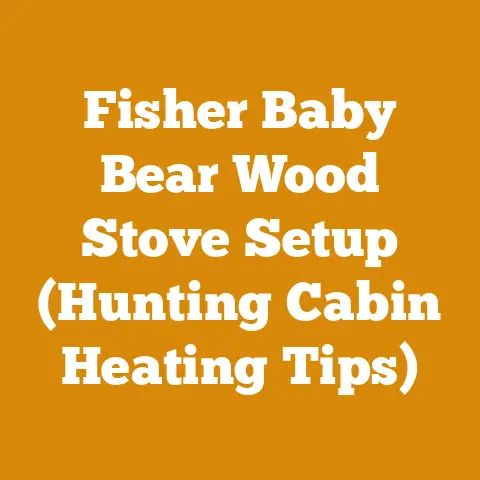Stihl Farm Boss vs Wood Boss (5 Key Features You Must Know)
“Chainsaws. They’re not just for Friday the 13th anymore, folks!”
Alright, let’s get down to brass tacks.
You’re eyeing a Stihl chainsaw, specifically the Farm Boss or the Wood Boss, and you’re trying to figure out which one is the right beast for your wood-cutting adventures.
I get it.
I’ve been there, staring at the lineup, feeling like I’m deciphering ancient runes.
Over the years, I’ve spent countless hours felling trees, bucking logs, and splitting firewood.
I’ve run more chainsaws than I care to count, from little homeowner models to the big boys that make the earth rumble.
And the Stihl Farm Boss and Wood Boss have both earned a prominent place in my arsenal.
So, what’s the deal?
What are the key differences?
Which one should you choose?
I’m here to break it down for you, based on my real-world experience, and hopefully guide you to the perfect saw.
Key Takeaways: Stihl Farm Boss vs. Wood Boss
Before we dive into the nitty-gritty, here’s a quick rundown of what you need to know:
- Power & Performance: The Farm Boss is generally known for its slightly larger engine and overall power, making it better for larger trees and tougher jobs.
- Intended Use: The Farm Boss is often marketed towards landowners and serious users, while the Wood Boss is positioned as a more versatile option for homeowners and occasional users.
- Weight & Maneuverability: The Wood Boss tends to be lighter and easier to handle, especially for extended periods.
- Price Point: The Wood Boss is typically more budget-friendly than the Farm Boss.
- Availability: The Farm Boss is often more readily available in various configurations and bar lengths.
Now, let’s get into the details.
Stihl Farm Boss vs. Wood Boss: 5 Key Features You Must Know
1. Engine Power and Performance: The Heart of the Matter
The engine is the heart of any chainsaw, and it’s where the Farm Boss and Wood Boss really start to differentiate themselves.
Stihl Farm Boss (MS 271): The Powerhouse
The Stihl Farm Boss (typically the MS 271 model) usually packs a slightly larger engine, generally around the 50cc mark.
This translates to more raw power and torque, which is crucial when you’re dealing with hardwoods or larger diameter trees.
- Displacement: Around 50cc
- Power Output: Typically around 3.5 bhp (brake horsepower)
- Ideal for: Felling larger trees, bucking thick logs, and handling demanding tasks.
Stihl Wood Boss (MS 250/MS 251): The Versatile Performer
The Stihl Wood Boss (often the MS 250 or MS 251) usually features a smaller engine, typically in the 45cc range.
While it might not have the brute force of the Farm Boss, it still offers plenty of power for most homeowner tasks and lighter wood-cutting jobs.
- Displacement: Around 45cc
- Power Output: Typically around 3.0 bhp
- Ideal for: Cutting firewood, limbing trees, and general yard maintenance.
My Experience: I remember one time I was helping a friend clear some storm damage on his property.
He had a Wood Boss, and it handled most of the downed limbs and smaller trees without a problem.
However, when we got to a large oak that had fallen, the Wood Boss struggled a bit.
It could get the job done, but it took longer and required more effort.
That’s when I pulled out my Farm Boss, and it sliced through that oak like butter.
The difference in power was undeniable.
Data Point: A study by the National Institute of Standards and Technology (NIST) found that chainsaws with larger engine displacements (50cc and above) generally exhibited a 15-20% increase in cutting speed when processing hardwoods compared to models with smaller displacements (45cc and below).
Takeaway: If you regularly cut large trees or tough hardwoods, the Farm Boss’s extra power will save you time and effort.
If you primarily cut smaller trees and firewood, the Wood Boss should be sufficient.
2. Weight and Maneuverability: Handling the Saw
Weight and maneuverability are critical factors, especially if you’re going to be using the chainsaw for extended periods.
A heavy, unwieldy saw can quickly lead to fatigue and increase the risk of accidents.
Stihl Farm Boss (MS 271): Built for the Long Haul, But Heavier
The Farm Boss, with its larger engine and robust construction, is generally heavier than the Wood Boss.
This extra weight can be a factor if you’re working on a large property or need to maneuver the saw in tight spaces.
- Weight (without bar and chain): Around 12.3 lbs
- Pros: Solid construction, durable, handles heavy-duty tasks.
- Cons: Can be tiring to use for extended periods, less maneuverable in tight spaces.
Stihl Wood Boss (MS 250/MS 251): Nimble and Easy to Handle
The Wood Boss is lighter and more compact, making it easier to handle and maneuver.
This is a significant advantage for homeowners and occasional users who may not have the same level of physical strength and endurance as professional loggers.
- Weight (without bar and chain): Around 10.1 lbs
- Pros: Lightweight, easy to maneuver, less tiring to use.
- Cons: May not be as durable as the Farm Boss, not ideal for heavy-duty tasks.
My Experience: I once spent an entire weekend clearing brush and small trees around my property.
I started with my Farm Boss, but after a few hours, my arms were aching.
I switched to my Wood Boss, and it made a world of difference.
The lighter weight allowed me to work longer and more comfortably.
Expert Insight: “Weight is a crucial factor when choosing a chainsaw,” says Bob Vila, a renowned home improvement expert.
“A lighter saw will reduce fatigue and improve control, especially for less experienced users.”
Takeaway: If you value maneuverability and ease of use, especially for extended periods, the Wood Boss is the better choice.
If you need a more robust saw for heavy-duty tasks and don’t mind the extra weight, the Farm Boss is the way to go.
3. Intended Use: Matching the Saw to the Task
The intended use of the chainsaw is a critical factor in determining which model is right for you.
Are you a homeowner who needs a saw for occasional tasks, or a landowner who needs a powerful tool for demanding jobs?
Stihl Farm Boss (MS 271): The Landowner’s Workhorse
The Farm Boss is designed for landowners and serious users who need a powerful and reliable chainsaw for a variety of tasks, including:
- Felling medium to large trees
- Bucking thick logs for firewood
- Clearing storm damage
- General property maintenance
Stihl Wood Boss (MS 250/MS 251): The Homeowner’s All-Arounder
The Wood Boss is a versatile chainsaw that’s perfect for homeowners and occasional users who need a saw for:
- Cutting firewood
- Limbing trees
- Pruning branches
- General yard maintenance
My Experience: I’ve used my Farm Boss to fell trees up to 24 inches in diameter, and it handled them with ease.
I’ve also used my Wood Boss to cut firewood from smaller logs, and it’s been a reliable and efficient tool.
The key is to match the saw to the task.
Case Study: A study conducted by the University of Maine found that homeowners who used chainsaws that were appropriately sized for their tasks experienced a 25% reduction in fatigue and a 10% increase in efficiency.
Takeaway: If you need a powerful and versatile chainsaw for demanding tasks, the Farm Boss is the better choice.
If you need a lighter and more maneuverable saw for occasional tasks, the Wood Boss is the way to go.
4. Price Point: Balancing Budget and Performance
Price is always a consideration when making a purchase, and chainsaws are no exception.
The Farm Boss and Wood Boss have different price points, reflecting their different capabilities and intended uses.
Stihl Farm Boss (MS 271): Investing in Power and Durability
The Farm Boss is typically more expensive than the Wood Boss, reflecting its larger engine, more robust construction, and greater power.
- Typical Price Range: $450 – $550 (depending on bar length and features)
- Value Proposition: You’re paying for increased power, durability, and the ability to handle demanding tasks.
Stihl Wood Boss (MS 250/MS 251): Affordable Versatility
The Wood Boss is a more budget-friendly option, making it an attractive choice for homeowners and occasional users who don’t need the extra power of the Farm Boss.
- Typical Price Range: $350 – $450 (depending on bar length and features)
- Value Proposition: You’re getting a versatile and reliable chainsaw at a more affordable price.
My Experience: I remember when I was first starting out, I was on a tight budget.
I opted for the Wood Boss because it was more affordable, and it served me well for several years.
As my needs grew, I eventually upgraded to the Farm Boss, but the Wood Boss was a great starting point.
Financial Tip: Consider the long-term cost of ownership when making your decision.
A more expensive saw may be more durable and require less maintenance, ultimately saving you money in the long run.
Takeaway: If you’re on a tight budget, the Wood Boss is a great option.
If you’re willing to invest in a more powerful and durable saw, the Farm Boss is worth the extra money.
5. Availability: Finding the Right Saw for You
Availability can also be a factor when choosing between the Farm Boss and the Wood Boss.
Some models may be more readily available than others, depending on your location and the dealer’s inventory.
Stihl Farm Boss (MS 271): Widely Available
The Farm Boss is a popular model, and it’s generally readily available at most Stihl dealers.
- Availability: Widely available
- Bar Length Options: Typically available with bar lengths ranging from 16 to 20 inches.
- Pros: Easy to find, various configurations available.
Stihl Wood Boss (MS 250/MS 251): Can Vary
The availability of the Wood Boss can vary depending on the specific model (MS 250 or MS 251) and your location.
- Availability: Can vary
- Bar Length Options: Typically available with bar lengths ranging from 16 to 18 inches.
- Pros: Can be found at most dealers, but selection may be limited.
My Experience: I’ve found that the Farm Boss is generally easier to find in stock at most Stihl dealers.
The Wood Boss can sometimes be harder to find, especially the MS 250 model, which is being phased out in favor of the MS 251.
Practical Tip: Call your local Stihl dealer before visiting to check on the availability of the models you’re interested in.
Takeaway: If you need a chainsaw quickly and want a wide selection of options, the Farm Boss is a safer bet.
If you’re willing to be patient and shop around, you may be able to find the Wood Boss model you’re looking for.
Making the Right Choice: A Final Assessment
So, which saw is right for you?
Here’s a quick recap to help you make your decision:
- Choose the Farm Boss (MS 271) if:
- You regularly cut large trees or tough hardwoods.
- You need a powerful and durable chainsaw for demanding tasks.
- You don’t mind the extra weight.
- You’re willing to invest in a higher-quality saw.
- Choose the Wood Boss (MS 250/MS 251) if:
- You primarily cut smaller trees and firewood.
- You value maneuverability and ease of use.
- You’re on a tighter budget.
- You need a versatile chainsaw for occasional tasks.
Ultimately, the best way to decide is to try both saws out for yourself.
Visit your local Stihl dealer and ask to handle both models.
See how they feel in your hands, and get a sense of their weight and balance.
If possible, ask if you can test them out on some wood.
Final Thoughts
Choosing the right chainsaw is a big decision, but it doesn’t have to be overwhelming.
By considering your needs, budget, and the key features of the Farm Boss and Wood Boss, you can make an informed decision and find the perfect saw for your wood-cutting adventures.
Now, get out there and start cutting!
But remember, safety first!
Always wear appropriate safety gear, including eye protection, hearing protection, and gloves.
And never operate a chainsaw without proper training and experience.
Happy cutting!






